2 Southwest Asia
The Southwest Asian region has enormous economic potential with huge markets, including India. It is also a strategically important region for realizing a “Free and Open Indo-Pacific (FOIP)” because of its location on land routes and sea lanes that connect East Asia with the Middle East.
At the same time, the Southwest Asian region still faces many challenges that need to be addressed, including infrastructure development, development of primary education as well as health and medical care systems, establishment of the legal system, and response to natural disasters. In particular, poverty reduction is a major challenge, with approximately one-third of the world’s poor said to be living in this region. Note 9 Japan provides a wide range of assistance to harness the economic potential of the region as well as to reduce disparities between the rich and the poor.
● Japan’s Efforts
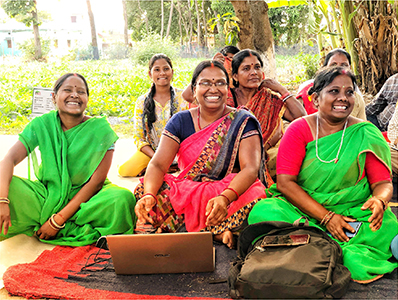
Women learning how to raise horticultural crops through technical cooperation under the “Jharkhand Horticulture Intensification by Micro Drip Irrigation (JHIMDI) Project,” yen loan project for India (Photo: JICA)
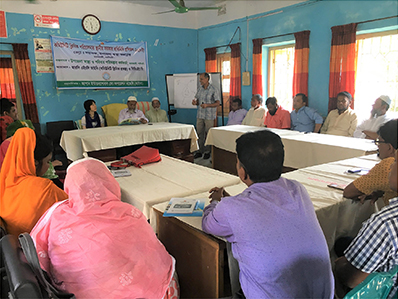
Members of the Union Councils (municipality) in Bangladesh discussing ways to enhance community clinic functions in training conducted as part of the “Project for Strengthening Health Systems through Organizing Communities” (Photo: JICA)
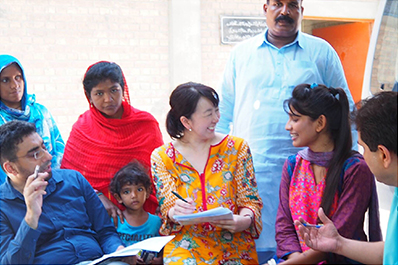
A JICA expert visiting a community and conducting survey interviews with residents in Pakistan under a technical cooperation project that supports market diversification of the country’s garment industry and expansion of its women’s employment (Photo: JICA)

An MRI machine provided to the Tribhuvan University Teaching Hospital in Nepal through a grant aid from Japan (Photo: JICA)
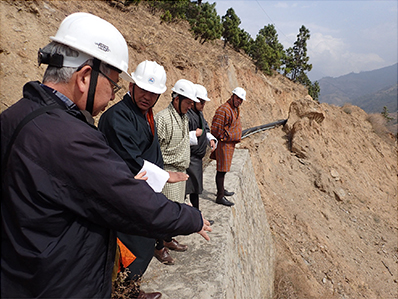
Japanese experts practicing vegetation works for preventing erosion and weathering of a road slope at the sites in Bhutan under the “Project for Capacity Development on Countermeasures of Slope Disaster on Roads in Bhutan” (Photo: JICA)
Many countries in Southwest Asia were also dealt great societal and economic blows by the spread of COVID-19. Through grant aid, Japan provided equipment, including small ambulances and portable X-ray machines, and training to medical institutions and other organizations in Bangladesh, Bhutan, and the Maldives. For Sri Lanka and the Maldives, in anticipation of the resumption of cross-border travel, Japan implemented grant aid for the development of human resources by providing equipment and facilities necessary for border control with countermeasures against infectious diseases.
In recent years, India has been one of the largest recipients of Japan’s yen loans. Japan has supported India for the development of economic and social infrastructure, including in the fields of electric power and transportation, the improvement of the investment environment, and human resources development, which would contribute to enhancing connectivity and strengthening industrial competitiveness. In addition, in support of its sustainable and inclusive growth, Japan plays a significant role in India’s growth through support for various fields, including support of the forestry sector with the aim of not only dealing with climate change but also improving livelihoods through effective utilization of forest products, support for the development of health and medical systems, and poverty reduction.
In March 2022, Japan provided a total of seven yen loan projects with a total amount of approximately 312 billion yen, including projects for the construction of the Dedicated Freight Corridor linking Delhi and Mumbai and metro rails in Chennai, road construction to improve connectivity, and development of agricultural production infrastructures to increase farmers’ incomes. At the Japan-India Summit Meeting held in March, Prime Minister Kishida referred to these seven yen loan projects and stated that the Government of Japan would like to continue to support the sustainable growth of India through cooperation in building quality infrastructure in India. In response, Prime Minister Modi expressed his appreciation for Japan’s support.
Furthermore, on the occasion of the Japan-India Summit Meeting in May 2022, Japan and India signed a yen loan agreement for the “Project for the Construction of Mumbai-Ahmedabad High Speed Rail (III),” and confirmed that they would continue to make steady progress on the high-speed rail project, which is a flagship project of Japan and India. Once the plan is completed, the travel time between Mumbai and Ahmedabad is expected to be shortened to approximately two hours, while it currently takes at least five hours by express train, and the train fare is expected to be roughly half of the corresponding airfare (see “Stories from the Field 5” for the “Project for Construction of the International Cooperation and Convention Centre”).
With regard to Bangladesh, which has been developing remarkably and attracting an increasing number of Japanese companies in recent years, Japan seeks to further advance the “Japan-Bangladesh Comprehensive Partnership” and promote development cooperation under the “Bay of Bengal Industrial Growth Belt (BIG-B)” initiative. The three pillars of the initiative are: (i) development of economic infrastructure, (ii) improvement of the investment environment, and (iii) enhancing connectivity. In June 2022, Japan provided two yen loan projects totaling approximately 165.9 billion yen to Bangladesh, including the “Dhaka Mass Rapid Transit Development Project (Line 5 Northern Route) (Phase 2)” to support the improvement of connectivity and economic infrastructure development.
Regarding the displaced persons fleeing from their homes in Rakhine State, Myanmar, to Bangladesh due to the deteriorating security situation, Japan has expressed its appreciation to the Government of Bangladesh for accepting the displaced persons for a prolonged period and reaffirmed its continued support, including reduction of the burden on host communities, at foreign ministers’ meetings and other occasions. Japan provides various forms of support to benefit the host communities and displaced persons. In addition to the support already provided to Cox’s Bazar District, in January 2022, Japan, ahead of other countries, extended Emergency Grant Aid of 2 million US dollars in total for displaced persons relocated to Bhasan Char in areas such as food and health through the United Nations High Commissioner for Refugees (UNHCR) and the United Nations World Food Programme (WFP). Furthermore, Japan provided support for improving the general living conditions of displaced persons in collaboration with other international organizations, such as the International Organization for Migration (IOM) and the United Nations Population Fund (UNFPA). On the other hand, under the framework of the Grant Assistance for Japanese NGO Projects, Japanese NGOs have provided assistance for the improvement of women’s livelihoods and the protection of children in the communities hosting the displaced persons. Japan also provides support through the Japan Platform (JPF) to deliver life-saving humanitarian assistance including distributing daily necessities, improving hygiene and sanitation, providing medical treatment, and protecting women and children. Japan’s grant aid to these displaced persons amounts to approximately 3.06 billion yen.
Moreover, Japan provides grant aid to Bangladesh for human resources development of young government officials.
Sri Lanka, which is strategically located along sea lanes connecting Asia with the Middle East and Africa, has traditionally been a country that is friendly to Japan. Japan has been working on strengthening cooperation with Sri Lanka in areas such as enhancing connectivity and the maritime sector, toward the realization of a “Free and Open Indo-Pacific (FOIP).” Japan also continues to support the regions that are lagging behind in development due to the impact of past conflicts, and provides assistance in areas such as livelihood improvement, industrial and human resources development with a focus on the agricultural sector, and countermeasures for natural disasters.
Since 2019, Sri Lanka has experienced large-scale tax reductions, and its main industry of tourism suffered a significant decline in the number of tourists due to the COVID-19 pandemic. This has led to a decrease in foreign currency reserves and difficulties in importing essential commodities such as medicines and food, which resulted in the worsening of the humanitarian situation. In response to this situation, the Government of Japan provided Emergency Grant Aid to Sri Lanka in May and September 2022, totaling 6.5 million US dollars, for humanitarian assistance in the areas of food, nutrition, health, and sanitation through international organizations.
The Maldives, as with Sri Lanka, is located in a strategic position along the sea lanes of the Indian Ocean. Japan has been working on strengthening cooperation with the country toward the realization of a FOIP. In 2022, Japan provided grant aid for police security equipment to the Maldives, which face security vulnerabilities as an island nation, and grant aid for enhancing resource conservation and waste management systems.
With the world’s fifth largest population, and its geopolitical importance as the interface between Asia and the Middle East, Pakistan plays a vital role in the international community’s efforts to eradicate terrorism. The stable development of Pakistan is important from the perspective of peace and stability in the surrounding regions, as well as in the international community as a whole.
In order to urgently address the rapidly worsening humanitarian situation caused by floods in Pakistan since June 2022, Japan provided Emergency Grant Aid of 7 million US dollars to Pakistan through international organizations in areas such as food, shelter and non-food relief items, health and medical care, and water and sanitation. Japan also provided emergency relief goods, including tents and plastic sheets through JICA. In January 2023, Parliamentary Vice-Minister for Foreign Affairs Akimoto attended the International Conference on Climate Resilient Pakistan and announced that, subject to the completion of domestic procedures, Japan will provide further assistance of approximately 77 million US dollars in areas such as disaster risk reduction, health and medical care, and agriculture, for the reconstruction and further development of Pakistan.
In addition, in 2022, Japan provided a grant aid to support vaccinations for polio eradication in Pakistan, where wild poliovirus is endemic. Japan also provided a grant aid to upgrade sewerage and drainage services in Punjab Province in 2021.
The establishment of democracy, stability, and prosperity in Nepal, a country that has had traditionally friendly relations with Japan is important for Japan to ensure the stability of the entire Southwest Asia region, which is also politically and economically important to Japan. After the major earthquake in Nepal in 2015, Japan has assisted with “Build Back Better” in the country. With Japan’s assistance, bridges, hospitals, and other public infrastructure facilities as well as a total of approximately 85,000 houses and a total of approximately 270 schools have been completed by October 2022. Japan also provides a range of technical support related to strengthening the government’s disaster risk reduction capabilities and promoting the use of buildings that comply with construction standards. Moreover, in 2022, Japan provided two yen loan projects, including support for economic growth and resilience, and two grant aid projects, including the rehabilitation of irrigation facilities (see “Project Introduction Column” for Japan’s assistance to Nepal).
Japan’s development cooperation toward Bhutan has achieved steady results, especially in the improvement of agricultural productivity, development of economic infrastructure such as road networks and bridges, and human resources development. In 2022, Japan provided grant aid for the construction of the Royal Centre for Infectious Diseases and the provision of medical equipment for the Centre, aiming to improve diagnoses and treatments for serious infectious diseases and to appropriately prevent the spread of infections.
Nepal
Ensuring the Continuation of Children’s Learning
Project for Improving the Quality of School Education in Nepal
Technical Cooperation Project (January 2019 – January 2024)
While Nepal has reached 96.6% in its primary school education enrollment rate, it faces the challenge of low academic achievement in mathematics among lower elementary students. Therefore, Japan decided to provide support for improving the basic academic performance in mathematics of students, including the development of mathematics learning materials that are easy for children to understand and handbooks for teachers, and training for teachers.
After the project started, elementary schools were closed for a long period of time due to the spread of COVID-19 since 2020, which posed a challenge to create an environment for children to continue learning.
In response to this situation, the project developed self-learning materials in cooperation with the Ministry of Education, Science and Technology of Nepal. The materials were distributed to all students in the first to third grades of elementary schools in pilot districts, a total of approximately 7,600 students, to enable them to continue high-quality mathematics learning at home. Special efforts were made to ensure that children could make progress in their studies even without face-to-face classes, such as indicating the corresponding page of the textbook in the learning materials as well as providing sufficient examples, illustrations, and exercises. These learning materials also include feedback sheets for parents and teachers to use with a view to stimulating communication between parents and teachers, which has been difficult in Nepal.
Thus, Japan provides assistance tailored to local needs and supports securing learning opportunities even under the difficult situation caused by COVID-19. Japan’s assistance aims to help children develop their academic ability without being left behind, toward the promotion of “Quality Education for All,” which is one of the SDGs.
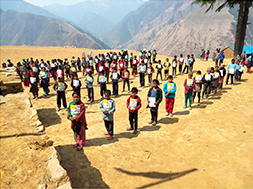
Elementary school students receiving self-learning materials at their school in Tatopani Village, Jumla District (Photo: JICA)
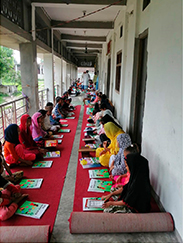
Students receiving explanations about how to use self-learning materials at an elementary school in Pipra Village, Mahottari District (Photo: JICA)
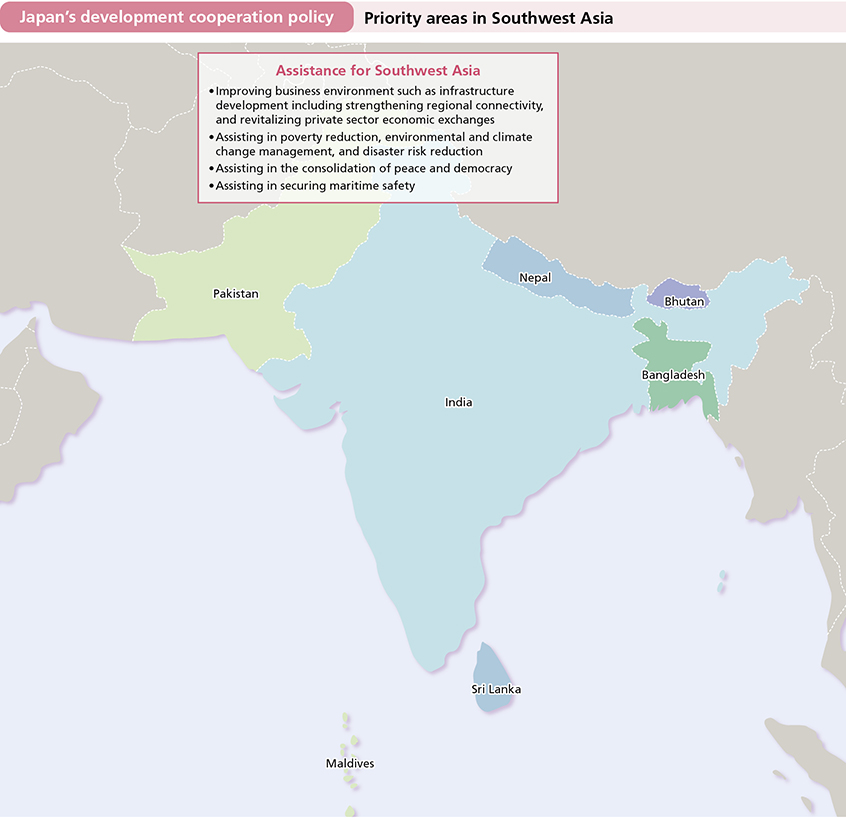
- Note 9: World Bank website (note that Afghanistan is included in South Asia).
https://www.worldbank.org/ja/country/japan/brief/south-asia (in Japanese only)
